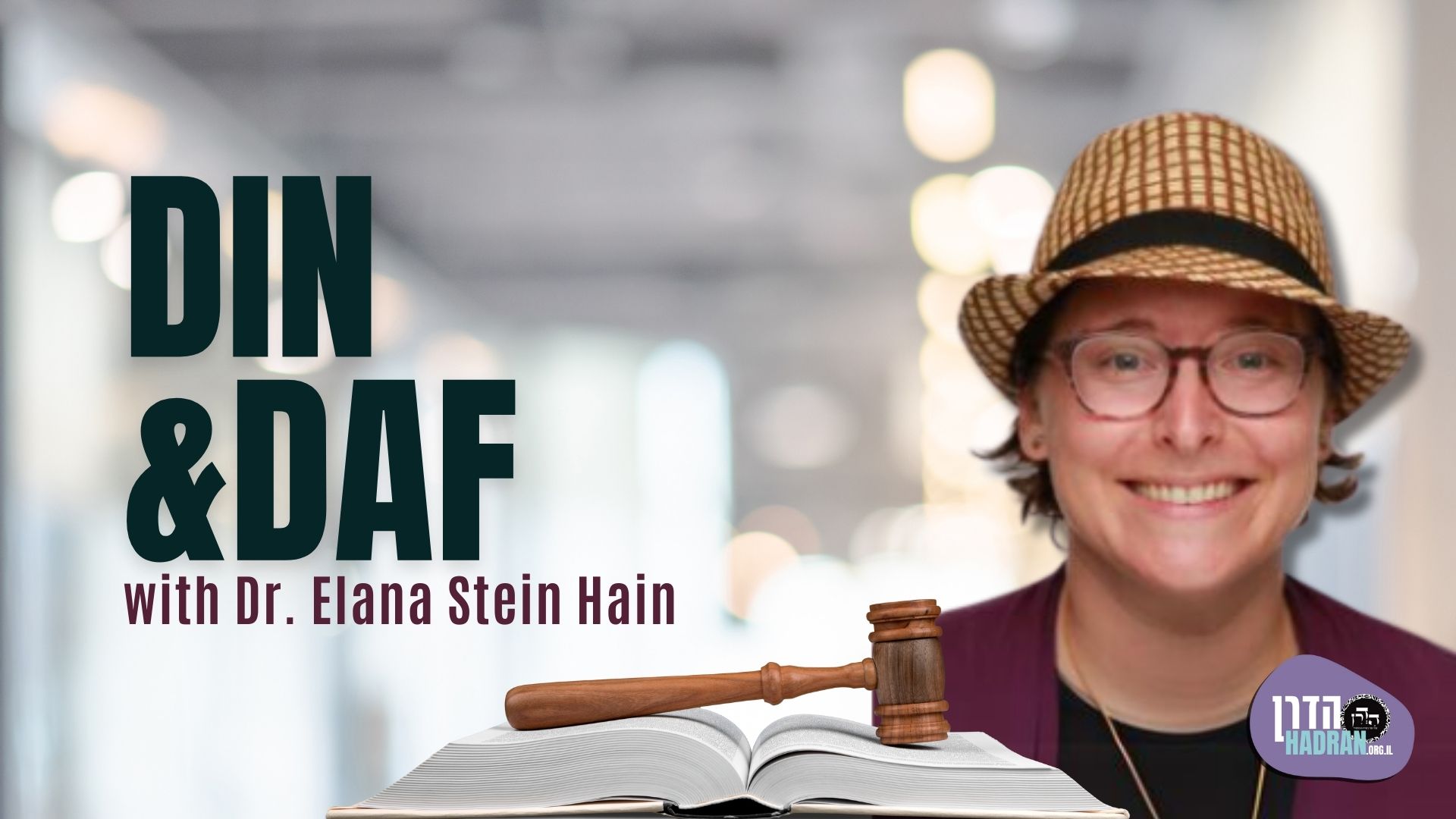Bava Batra 92
הַמּוֹכֵר פֵּירוֹת לַחֲבֵרוֹ, וּזְרָעָן וְלֹא צִמֵּחוּ; וַאֲפִילּוּ זֶרַע פִּשְׁתָּן – אֵינוֹ חַיָּיב בְּאַחְרָיוּתָן. רַבָּן שִׁמְעוֹן בֶּן גַּמְלִיאֵל אוֹמֵר: זֵרְעוֹנֵי גִּינָּה שֶׁאֵינָן נֶאֱכָלִין, חַיָּיב בְּאַחְרָיוּתָן.
MISHNA: With regard to one who sells produce to another that is sometimes purchased for consumption and sometimes for planting, and the buyer planted it and it did not sprout, and even if he had sold flaxseeds, which are only occasionally eaten, the seller does not bear financial responsibility for them, i.e., he is not required to compensate the buyer. Since the buyer did not specify that he purchased the produce in order to plant it, the seller can claim that he assumed the buyer intended to eat it. Rabban Shimon ben Gamliel says: If he had sold seeds for garden plants, which are not eaten at all, then the seller bears financial responsibility for them, as they were certainly purchased for planting.
גְּמָ׳ אִיתְּמַר: הַמּוֹכֵר שׁוֹר לַחֲבֵירוֹ וְנִמְצָא נַגְחָן, רַב אָמַר: הֲרֵי זֶה מִקָּח טָעוּת; וּשְׁמוּאֵל אָמַר, יָכוֹל לוֹמַר לוֹ: לִשְׁחִיטָה מְכַרְתִּיו לָךְ.
GEMARA: An amoraic dispute was stated with regard to one who sells an ox to another and the ox is found to be one that habitually gores. Rav says: This is a mistaken transaction, since the buyer can claim that he bought the ox specifically for labor, and an ox that gores is not suitable for this function. Therefore, the seller must take back the ox and reimburse the buyer. And Shmuel says: The sale is not voided, as the seller can say to him: I sold it to you for slaughter, and the fact that it gores is immaterial.
וְלִיחְזֵי; אִי גַּבְרָא דְּזָבֵין לְנִכְסְתָא – לְנִכְסְתָא, אִי לְרִדְיָא – לְרִדְיָא! בְּגַבְרָא דְּזָבֵין לְהָכִי וּלְהָכִי.
The Gemara suggests: But let us see if the buyer is a man who generally purchases oxen for slaughter, in which case it can be presumed that he also purchased this ox for slaughter, or if he is a man who generally purchases oxen for plowing, in which case it can be presumed that he also purchased this ox for plowing. The Gemara answers: The dispute concerns a man who sometimes purchases oxen for this purpose and sometimes for that purpose, and so it is uncertain for which purpose he purchased this ox.
וְלִיחְזֵי דְּמֵי הֵיכִי נִינְהוּ!
The Gemara persists: But let us see the payment he made; how much was it? Since an ox fit for plowing costs more than one fit only for slaughter, the purpose for which the ox was purchased will be apparent from the price paid.
לָא צְרִיכָא; דְּאִיַּיקַּר בִּישְׂרָא, וְקָם בִּדְמֵי רִדְיָא. אִי הָכִי, לְמַאי נָפְקָא מִינַּהּ? נָפְקָא מִינַּהּ לְטִרְחָא.
The Gemara answers: No, it is necessary to discuss the case where the price of an ox to be slaughtered for its meat appreciated and reached the value of an ox for plowing. But if the price disparity is significant, there is no dispute. The Gemara asks: If so, for the sake of what practical difference did they discuss the case? Even if the ox was not suitable for the buyer’s purposes, he could sell it for the same price of the ox he needs. The Gemara answers: The practical difference is with regard to the effort of selling the ox in order to recover its value; who must go to the effort of doing so?
הֵיכִי דָּמֵי?
The Gemara clarifies: What are the circumstances of the case under discussion?
אִי דְּלֵיכָּא לְאִישְׁתַּלּוֹמֵי מִינֵּיהּ, לִיעַכַּב תּוֹרָא בְּזוּזֵיהּ! דְּאָמְרִי אִינָשֵׁי: מִן מָרֵי רְשׁוּתָיךְ – פָּארֵי אִפְּרַע!
If this is a case where the seller does not have sufficient funds for the buyer to be reimbursed by him, then let the buyer retain the ox itself in lieu of his money, as people say: If you wish to ensure that you will get paid, collect even bran, an inferior commodity, from one who is in your debt. Consequently, even according to the opinion of Rav, the buyer will be likely to retain the ox. What, then, is the practical difference between the opinions of Rav and Shmuel?
לָא צְרִיכָא, דְּאִיכָּא לְאִישְׁתַּלּוֹמֵי מִינֵּיהּ.
The Gemara answers: No, it is necessary to discuss the case where the seller does have sufficient funds for the buyer to be reimbursed by him.
רַב אָמַר: הֲרֵי זֶה מִקָּח טָעוּת – בָּתַר רוּבָּא אָזְלִינַן, וְרוּבָּא לְרִדְיָא זָבְנִי. וּשְׁמוּאֵל אָמַר לָךְ: כִּי אָזְלִינַן בָּתַר רוּבָּא – בְּאִיסּוּרָא, בְּמָמוֹנָא – לָא.
The Gemara explains the logic of each opinion: Rav says: This is a mistaken transaction, as in cases of uncertainty we follow the majority, and since the majority of people purchase oxen for plowing, it is presumed that this buyer also purchased the ox for plowing. Accordingly, since the ox he received was not suitable for plowing, the sale is void. And Shmuel could have said to you: When we follow the majority, that is only with regard to ritual matters, but with regard to monetary matters, such as this, we do not follow the majority. Accordingly, there is no basis for voiding the sale.
(סִימָן: אִשָּׁה, וְעֶבֶד, שׁוֹר, שְׁוָרִין, וּפֵירוֹת.)
The Gemara cites a mnemonic that indicates the topics of the cases it will reference to challenge either Rav’s or Shmuel’s opinion: Woman, and slave, ox, oxen, and produce.
מֵיתִיבִי: הָאִשָּׁה שֶׁנִּתְאַלְמְנָה אוֹ נִתְגָּרְשָׁה; וְהִיא אוֹמֶרֶת: בְּתוּלָה נִישֵּׂאתִי, וְהוּא אוֹמֵר: לֹא כִי, אֶלָּא אַלְמָנָה נְשָׂאתִיךְ – אִם יֵשׁ עֵדִים שֶׁיָּצְאָה בְּהִינוּמָא, וְרֹאשָׁהּ פָּרוּעַ – כְּתוּבָּתָהּ מָאתַיִם.
The Gemara raises an objection to Rav’s opinion from a mishna (Ketubot 15b): With regard to a woman who was widowed or divorced, and is in dispute with her husband or his heirs over the value of the payment she should receive for her marriage contract, and she says: When you married me I was a virgin, and so I am entitled to two hundred dinars, and he says: That is not the case; rather, when I married you, you were a widow, and so you are entitled to only one hundred dinars, then if there are witnesses that she went out of her father’s house to her wedding with a veil [hinnuma] or with the hair of her head loose, in the typical manner of virgin brides, that is considered sufficient evidence in support of her claim, and so the payment of her marriage contract is two hundred dinars.
טַעְמָא דְּאִיכָּא עֵדִים, הָא לֵיכָּא עֵדִים – לָא; וְאַמַּאי? לֵימָא: הַלֵּךְ אַחַר רוֹב הַנָּשִׁים, וְרוֹב נָשִׁים – בְּתוּלוֹת נִישָּׂאוֹת!
The Gemara infers: The reason that she receives two hundred dinars is that there are witnesses to her claim. Therefore, if there were no witnesses, her claim would not be successful. The Gemara asks: But why? Let us say that since there is an uncertainty, one should follow the majority of women, and since the majority of women marry as virgins, it should be presumed that this woman also married as a virgin. Accordingly she should be entitled to two hundred dinars. Since this is not the case, it is apparent that the majority is not followed in monetary matters.
אָמַר רָבִינָא, מִשּׁוּם דְּאִיכָּא לְמֵימַר: רוֹב נָשִׁים בְּתוּלוֹת נִישָּׂאוֹת, וּמִיעוּט אַלְמָנוֹת; וְכׇל הַנִּישֵּׂאת בְּתוּלָה – יֵשׁ לָהּ קוֹל; וְזוֹ, הוֹאִיל וְאֵין לָהּ קוֹל – אִיתְּרַע לֵהּ רוּבָּא.
Ravina said: In this case, one cannot decide the case based on the majority of women because there is room to say that it is so that the majority of women marry as virgins and only a minority marry as widows or non-virgins. But it is also so that there is an additional presumption: The marriage of anyone who marries as a virgin generates publicity of that fact. And with regard to this woman, who is in a dispute over the value of her marriage contract, because her marriage did not generate publicity of her marrying as a virgin, the ability to apply what is true of the majority of women to her case is undermined. Accordingly, there is no proof that the majority is not followed in monetary matters.
אִי כׇּל הַנִּישָּׂאוֹת בְּתוּלוֹת יֵשׁ לָהֶן קוֹל, כִּי אִיכָּא עֵדִים מַאי הָוֵי? מִדְּלֵית לַהּ קוֹל – סָהֲדִי שַׁקָּרֵי נִינְהוּ!
The Gemara questions this: If it is really true that the marriage of anyone who marries as a virgin generates publicity of that fact, then even when there are witnesses that she was a virgin bride, what of it? From the fact that her marriage did not generate publicity of her marrying as a virgin, perforce they are false witnesses.
אֶלָּא רוֹב הַנִּישָּׂאוֹת בְּתוּלוֹת יֵשׁ לָהֶן קוֹל, וְזוֹ, הוֹאִיל וְאֵין לָהּ קוֹל – אִיתְּרַע לֵהּ רוּבָּא.
Rather, one must modify the above argument to say that the majority of marriages of women who marry as virgins generate publicity of that fact, and with regard to this woman, since her marriage did not generate publicity of her having been married as a virgin, the ability to apply what is true of the majority of women to her case is undermined.
תָּא שְׁמַע: הַמּוֹכֵר עֶבֶד לַחֲבֵרוֹ וְנִמְצָא גַּנָּב אוֹ קוּבְיוּסְטוּס, הִגִּיעוֹ. לִסְטִים מְזוּיָּין אוֹ מוּכְתָּב לַמַּלְכוּת – אוֹמֵר לוֹ: הֲרֵי שֶׁלְּךָ לְפָנֶיךָ.
Come and hear a challenge to Shmuel’s opinion from a baraita: In the case of one who sells a slave to another, and the slave is found to be a thief or a gambler [kuvyustus], and the buyer does not wish to have such a slave, nevertheless it has come to him, i.e., the slave is acquired by the one who purchased him and the transaction is nonrefundable. By contrast, if the slave is found to be an armed bandit [listim] or has been judged and written to be executed by the government, then the buyer can return the slave to the seller and say to him: That which is yours is before you; return the money I paid for him, as the sale is void.
רֵישָׁא –
The Gemara explains the proof from the baraita: In the first clause of the baraita,
























